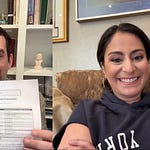Here’s Tuesday’s conversation from The Doctor’s Lounge with guest Dr. Anne Zink. There are very few individuals who understand both the frontlines of medicine (she’s a fellow ER physician) and the “system” as Dr. Zink does (she was Alaska’s chief medical officer from 2018-2024). That’s what makes her perspective so unique.
Here are some of the major points we touched upon...
What is the difference between public health and healthcare? Dr. Zink breaks it down about as clearly as I’ve ever heard it explained.
Our system asks patients to work for it, instead of the other way around. Dr. Zink describes the hidden burdens of bureaucracy around healthcare access.
We discussed Alaska (where Dr. Zink lives) as a proving ground for smarter medicine. From head trauma protocols to tribal health systems, we heard great examples of how often necessity drives innovation.
Medicaid cuts. Why new rules enacted under the “One Big Beautiful Bill” will quietly push millions off coverage who have no idea it’s coming.
Launching PopHive: a new public tool for real-time health data that Dr. Zink is helping to build at Yale. I’ve seen it. I’ve toyed around with it. I’ve even done some backend (free) consulting on it. It’s impressive.
But there’s much more. Take a listen to our conversation. Or, if you prefer, you can peruse a ChatGPT-generated summary of our conversation below (with timecodes so that you can watch or listen to particular parts that may grab your interest).
I hope you find this one as informative as I did!
(Note: I’ve been able to keep sessions like this free for everyone, thanks to recent upgrades that sustain this work. If you’d like to support work like this, please click here. Closed captions (㏄) and a transcript option (📄) can be found beneath the video playback control bar above.)
A summary of key points and highlights from The Doctor’s Lounge.
(Aided by ChatGPT.)
Dr. Anne Zink joins us in the Doctor’s Lounge – 00:00:00
We open the session by resetting the room and introducing Dr. Anne Zink, former Chief Medical Officer of Alaska, now at Yale School of Public Health. The topic: the distinction and connection between health care, public health, and population health.
Defining public health vs. healthcare – 00:01:04
Dr. Zink explains that healthcare refers to individual medical services (e.g., chest pain in the ED), while public healthscales up to communities and populations. She emphasizes that population health includes insured and uninsured individuals and shouldn't be conflated with governmental health programs alone.
Population health isn’t just a buzzword – 00:02:24
Zink criticizes how the term “population health” has been co-opted by health systems to mean short-term risk management for covered patients, rather than long-term generational health outcomes. She argues for a unified health system—not separate public and clinical silos.
Public health is misunderstood – 00:04:15
People often associate "public health" with the uninsured. But as Dr. Zink explains, if you drink safe water, eat safely at a restaurant, or avoid lead poisoning, that's public health. Everyone depends on it.
Emergency medicine and public health overlap – 00:05:50
Dr. Zink frames emergency medicine as frontline public health—where policy failures manifest. Her burnout solution: going upstream to address the root causes of repeated ED visits.
The system is upside down – 00:07:07
Patients are forced to navigate a maze of care, billing, and approvals. Zink wants systems to work for people—not the other way around. She highlights the invisible costs of missed work, isolation, and stress, especially for the elderly.
Medicaid bureaucracy hurts patients and workers – 00:09:25
She notes the burden on both sides: patients and public employees alike. Bureaucracy wastes resources, burns out providers, and diverts funds from care to paperwork.
Alaska as a laboratory of necessity – 00:13:18
Zink details how Alaska’s geography forces efficiency and clarity. For example, new head trauma guidelines were developed out of practical need—and are now informing national practice.
Telehealth and digital health: mixed progress – 00:17:34
Zink sees telehealth as essential, but worries we’ve pulled back post-pandemic. She calls for “digitally enabled care,” like remote image reading or asynchronous consults—not just Zoom appointments.
Trust is foundational – 00:20:59
Zink urges a shift from systems designed around mistrust (fraud-prevention-first) to systems built on trust with verification. Most patients and providers, she argues, are trying their best.
Presence still matters in the ER – 00:22:00
The conversation turns philosophical. Dr. Faust explores how being physically present influences conversations—especially when discharging low-risk patients. Touch, tone, and posture shape trust in ways that can’t always be replicated remotely.
Community trust models: lessons from Alaska – 00:24:58
Dr. Zink highlights the Alaska tribal health system, where trusted community health aides form the foundation of care. Locally grounded care, with telehealth support, works—both medically and culturally.
Medicaid cuts from the “One Big Beautiful Bill” – 00:33:10
Zink warns that recent Medicaid cuts don’t deny eligibility outright but weaponize bureaucracy. Six-month recertification and work requirements are designed to cause churn, not improve efficiency. This affects real people—like caregivers, gig workers, and those with opioid use disorder.
Better policy paths for Medicaid reform – 00:38:00
She offers a better approach: extend postpartum coverage (as CMS allowed post-ACA), reduce 1115 waiver complexity, and create optional best-practice packages states can adopt without red tape. Public servants know what their populations need—they just need flexibility.
Managed Medicaid: more layers, more complexity – 00:41:48
Zink explains how many states outsource Medicaid to private companies to avoid dealing with federal bureaucracy—but that just shifts the burden and adds profit-seeking middlemen.
Data modernization and PopHive – 00:44:57
Zink introduces PopHive.org, her new initiative with Yale, braiding together de-identified Epic Cosmos data, public health stats, wastewater, and Google Trends. Goal: democratize access to real-time, actionable population-level data.
De-identified ≠ dangerous – 00:48:03
We underscore the importance of protecting individual privacy while supporting public access to de-identified data to improve policy, catch trends, and direct resources more effectively.
Final takeaways – 00:52:30
Dr. Zink shares how before the ACA, she couldn’t even buy maternity coverage in Alaska. That changed lives. She’s now focused on slashing red tape and empowering public health officials with better tools to serve real people.
Join the conversation. Contribute your thoughts in the Comments section.
If you have information about any of the unfolding stories we are following, please email me or find me on Signal at InsideMedicine.88.














Share this post